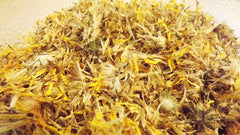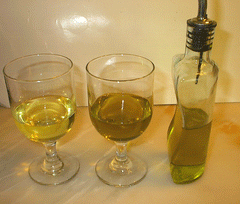Organic Arnica oil for arthritic pain and inflammation
Arnica (Arnica montana) is a well-known and well-established herbal cure for anyone who has ever experienced the debilitating
pain and inflammation of arthritis, broken bones, sprains, gout, pulled muscles
or torn ligaments. We began infusing (also commonly referred to as macerating) our own Arnica oil several years ago when
we realized that some of the most important constituents in this amazing herb
can be lost if processed at high temperatures. This herb has also been referred to as Arnica chamissonis, leopard's bane and mountain tobacco. The product we use is from the flowers of Arnica montana that are collected at the end of the summer and dried for medicinal use. We are diligently looking for local growers and our dream, of course, is to have land of our own to grow and dry our own plants. In the meantime, we carefully source our herbs from a company who is extremely concerned about the environment and tests for pesticides and heavy metals. We receive fresh herbs that still have their natural color and brightness intact, as you can see from the picture. If not used immediately, we store our herbs in dark glass in dark closed cabinets.
What are the benefits of Arnica montana oil?:
Traditionally the benefits from this plant are obtained from
the flowers and the roots. In countries where Arnica is indigenous it has been
used as a popular remedy for pain, bruises, rheumatism, as well as many other
inflammatory conditions. In North America the flower is what is used most
frequently and this is in fact what we use in our organic Arnica infused oil - not to be confused with an essential oil. Although due
to its potential toxicity the internal use of Arnica is allowed only in
homeopathic remedies - this caution does NOT apply to the external topical application. In fact, this particular
plant is well-known as one of the best remedies for external local healing and
can be used as a compress or included in a massage oil or cream. Which is why it is one of the main ingredients in our very popular Spicey Muscle Oil.
According to the most reliable authority, The Complete German Commission E Monographs, arnica contains helenalin, its most active sesquiterpene lactone, responsible for its anti-inflammatory and pain-relieving effects (1, 2), for those who are interested, and 11,13-dihydrohelenalin. This plant also contains the flavanoids of isoquercitrin, luteolin-7-glucoside, and astragalin, the volatile oil (with thymol and its derivatives), phenol carbonic acid (chlorogenic acid, cynarin, caffeic acid), and coumarins (umbelliferone, scopoletin). Arnica montana is known to contain 10 different constituents which have anti-inflammatory and pain relieving benefits. According to the Aromatic Guide to the Use of Herbs by Kolbjorn Borseth, the essential oils of this plant "stimulates the mopping up and reabsorption of blood from the bruised tissue and hastened the replacement of damaged tissue with new cells.” According to Richo Cech in his classic book Making Plant Medicine, he indicates that "arnicated oil" is an excellent penetrating anti-inflammatory for treating traumatic injuries such as bruises, sprains and torn ligaments. He goes on to say that “Arnica resolves stuck blood.” And in yet another herbal classic entitled "The Herbal Medicine Makers Handbook" by James Green, he indicates that Arnica oil can also be blended into equal parts with infused calendula and infused St. John's Wort oils for soothing traumatic injuries including small to major ones. We are also offering these two infused oils on our website and, of course, they are the base for our previously mentioned Spicey Muscle Oil.
Our organic herbal tradition process:
While making our unique infused oil, we use only the
certified organic flowers of Arnica montana and infuse these flowers in a
certified organic high oleic sunflower oil. The sunflower oil alone has an
amazing array of benefits the details of which can be found on our website. Research has shown that sunflower oil when used on premature infants
actually increased their ability to survive. Use in soaps, creams,
lotions and/or massage oils. As mentioned previously, we infuse these
flowers for weeks at low temperatures to ensure that we are obtaining the
maximum amount of healing constituents. We are now offering this infused oil to
the public on our website in a one ounce treatment bottle, or 2 or 4 ounce
glass amber bottle. The amber glass is used to protect these precious healing constituents from UV light. Our prices are extremely competitive as our
overhead costs are substantially lower than larger operations. Additionally, in
the best herbal tradition, we do this
process in small batches and fully believe that the energy of good will and
purpose as we stir these oils daily will be reflected in the overall quality of
the end product. Our final infused/macerated oils are stored in recycled wine bottles
with vacuum pumps to insure no benefits are lost - and we store them in a
refrigerated room to insure their freshness.
SAFETY AND CAUTIONS:
All herbalists agree that Arnica montana oil should not be applied to an opened wound. Repeated application to the skin can cause irritation. Do not apply to broken skin and this herb is not recommended while pregnant or nursing.
Thanks for listening!

1. Lyss, G., T. J. Schmidt, I. Merfort, and H. L. Pahl. "Helenalin, an anti-inflammatory sesquiterpene lactone from Arnica, selectively inhibits transcription factor NF-kappaB." Biological Chemistry 378.9 (1997): 951-61. Web.
2. Lyss, G., A. Knorre, T. J. Schmidt, H. L. Pahl, and I. Merfort. "The anti-inflammatory sesquiterpene lactone helenalin inhibits the transcription factor NF-kappaB by directly targeting p65." Biological Chemistry 273.50 (1988): 33508-16. Web.

























